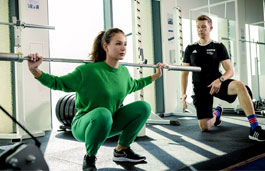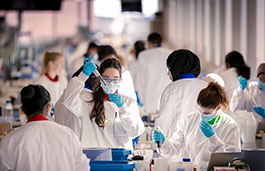Search
Public Health Nutrition MSc
Study level: Postgraduate
Learn about nutrition science, public health policy and entrepreneurship and develop the skills needed to lead and enhance health outcomes locally and globally.
Year of entry
Location
Coventry University (Coventry)
Study mode
Full-time
With Professional Placement
Duration
1 year full-time
Up to 2 years full-time with professional placement
Course code
EEST051
Start date
November 2025
January 2026
March 2026
May 2026
July 2026
Course overview
Suitable for professionals or graduates, this course aims to develop your expertise in public health to address global challenges and enhance community wellbeing. It should also advance your career and professional development in health promotion, policy and research.
- Examine global public health challenges, including health inequalities and disease prevention.
- Gain practical skills in health data analysis, programme evaluation and policy development.
- Develop skills to design and implement impactful public health initiatives.
5 QS Stars for Teaching and Facilities
QS Stars University RatingsRanked 9th Modern University in UK by the Times
The Times and Sunday Times Good University Guide 2025Ranked 4th for Overall Satisfaction in PTES
Postgraduate Taught Experience Survey (PTES) 2025Why you should study this course
- Comprehensive expertise: develop advanced knowledge of nutrient functions, metabolism and nutritional assessment for diverse populations and life stages.
- Focus on behavioural and social determinants: learn to analyse health inequalities, behavioural factors and communication strategies to design impactful lifestyle interventions.
- Global and systemic perspectives: explore the complexities of global food systems and their effects on health, equipping you to address challenges in both local and global contexts.
- Practical and research skills: gain hands-on experience in data analysis, ethical research and intervention design through your independent research module.
- Gain practical experience: boost your CV with an additional professional placement. See the modules for more details.2
What you'll study
Study topics such as social determinants of health, public health interventions, research methods and entrepreneurship in healthcare. Learn practical skills, develop critical thinking and use evidence-based practice to address health inequalities and improve population health outcomes.
We regularly review our course content, to make it relevant and current for the benefit of our students. For these reasons, course modules may be updated.
How you'll learn
Teaching and learning methods may include:
- lectures
- seminars
- tutorials
- presentations
- group projects
- workshops
- practical laboratory sessions.
Teaching contact hours
As a full-time postgraduate student, you will study modules totalling 180 credits each academic year. A typical 30-credit module requires a total of 300 hours of study. Study hours are made up of teaching contact hours, and guided and independent study.
Teaching hours
Teaching hours may vary, depending on where you are in your studies, but on average you will have between 8 and 12 teaching and learning hours each week. You will also have the opportunity to attend optional sessions including time with a Success Coach or to meet with staff for advice and feedback.
Guided and independent study
Throughout your studies, you will be expected to spend time in guided and independent study to make up the required study hours per module. You will be digging deeper into topics, reviewing what you’ve learnt and completing assignments. This can be completed around your personal commitments. As you progress to the end of your studies, you’ll spend more time on independent learning.
Online learning
As an innovative university, we use different teaching methods, including online tools and emerging technologies. So, some of your teaching hours and assessments may be delivered online.
Assessment
This course will be assessed using a variety of methods which could vary depending on the module. Assessment methods may include:
- written case studies and reports
- online tests
- viva voce
- oral presentations
- individual assignments.
The Coventry University assessment strategy aims to ensure that our courses are fairly assessed and allows us to monitor student progression towards achieving the intended learning outcomes.
Entry requirements
Fees and funding
| Student | Full-time | Part-time |
|---|---|---|
| UK, Ireland*, Channel Islands or Isle of Man | £11,200 £1,500 professional placement fee (if placement secured) |
Not available |
| EU | £11,200 per year with EU Support Bursary** £1,500 professional placement fee (if placement secured) per year with EU Support Bursary** £18,600 per year without EU Support Bursary** £1,800 professional placement fee (if placement secured) per year without EU Support Bursary** |
Not available |
| International | £18,600 £1,800 professional placement fee (if placement secured) |
Not available |
For advice and guidance on tuition fees3 and student loans visit our Postgraduate Finance page and see the university's Tuition Fee and Refund Terms and Conditions.
We offer a range of International scholarships to students all over the world. For more information, visit our International Scholarships page.
Tuition fees cover the cost of your teaching, assessments, facilities and support services. There may be additional costs not covered by this fee such as accommodation and living costs, recommended reading books, stationery, printing and re-assessments should you need them.
The following are additional costs not included in the tuition fees:
- Any optional overseas field trips or visits: £400+ per trip.
- Any costs associated with securing, attending or completing a placement (whether in the UK or abroad).
*Irish student fees
The rights of Irish residents to study in the UK are preserved under the Common Travel Area arrangement. If you are an Irish student and meet the residency criteria, you can study in England, pay the same level of tuition fees as English students and utilise the Tuition Fee Loan.
**EU Support Bursary
Following the UK's exit from the European Union, we are offering financial support to all eligible EU students who wish to study an undergraduate or a postgraduate degree with us full-time. This bursary will be used to offset the cost of your tuition fees to bring them in line with that of UK students. Students studying a degree with a foundation year with us are not eligible for the bursary.
Facilities
- Computer labs
Equipped with industry-standard hardware and software to empower your research-informed learning and prepare you for the world of work. Learn how to use nutrition software and undertake statistical analyses. - Kitchen
For product design and development projects. - Physiology lab
Gain experience in measuring physiological parameters such as heart rate and lung function. The lab features equipment including Wattbike Pros, Wattbike AtomX’s and Cortex Metalyzers for measuring expired gas. - Study spaces
Each floor of the Alison Gingell Building has a mixture of desks, pods and booths for individual or group study.

Lanchester Library
The library is usually open 24/7, in term-time. It’s where you can access your course’s specialist Academic Liaison Librarian. It’s also home to specialist teams which can support you with your academic writing and maths and statistics questions.

The Hub
The Hub is the centre of student life on campus. Facilities include a food court, convenience store, multi-faith centre, medical centre, hairdresser, coffee shops and the Your SU offices. It has fully licensed function spaces and a bar.

Careers and employability
Get one-on-one career and employability guidance lasting up to 18 months from the end of your course. We’ll help you find placements and graduate roles, offer CV and application checks, mentoring, skills workshops, employer events and more.
Facilities are subject to availability. Access to some facilities (including some teaching and learning spaces) may vary from those advertised and/or may have reduced availability or restrictions where the university is following public authority guidance, decisions or orders.
Careers and opportunities
Prepare for a career as a public health nutritionist, health policy analyst, community health programme developer, health promotion specialist, corporate wellness consultant, nutritional epidemiologist, research scientist or academic.
How to apply
You may also like

Sport and Exercise Psychology MSc






